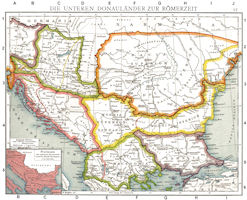Pannonia Inferior
 Pannonia lay east of Noricum; it was reduced into a Eoman province by Tiberius, and was divided into Superior and Inferior, the former comprising a portion of Hungary, the latter, Sclavonia. Vindobona, now Vienna, was situated in Pannonia Superior; as also were Acincum, now Buda; and Contra Acincum, now Pesth. Sirmium, from which the surrounding district Sirmia takes its name, was situated in Pannonia Inferior, on the river Savus, or Saave.
Pannonia lay east of Noricum; it was reduced into a Eoman province by Tiberius, and was divided into Superior and Inferior, the former comprising a portion of Hungary, the latter, Sclavonia. Vindobona, now Vienna, was situated in Pannonia Superior; as also were Acincum, now Buda; and Contra Acincum, now Pesth. Sirmium, from which the surrounding district Sirmia takes its name, was situated in Pannonia Inferior, on the river Savus, or Saave.
Pannonia, on the south of the Danube, included the eastern parts of modern Austria, Styria, Carinthia, and Carniola, the whole of Hungary between the Danube and the Save, and a part of Croatia and Bosnia. Those enormous plains, extending between the Danube and the Alps, the western portions of which formed the upper Paunonian, and the eastern the lower Pannonian provinces, were inhabited by a numerous and warlike tribe of Illyrian descent, a rude and wild people with whom some few small Celtic tribes were intermixed.
Augustus, through his stepsons Drusus and Tiberius, had added to the empire the whole of the Alpine chain as far as the Danube, under the names of the provinces of Rhaetia, Noricum, and Pannonia. The Romans did not consider these countries parts of Germany proper; before their conquest they were included in Illyria.
The country of Pannonia and Dalmatia, which occupied the space between the Danube and the Hadriatic, was one of the last and most difficult conquests of the Romans. In the defence of national freedom, two hundred thousand ©f these barbarians had once appeared in the field, alarmed the declining age of Augustus, and exercised the vigilant prudence of Tiberius at the head of the collected force of the empire.
These Pannonians, the Romans, under the order of Tiberius, were obliged to reduce afresh. The struggle was a bloody one, and lasted for many years. To the old Pannonian towns of Nauportus, Siscia, and Sirmium, new ones were now added by the Romans: the originally Celtic town, Vindobona, afterwards converted into a Roman municipium, served as a military arsenal, and continued for long a flourishing city; Sabaria, the old Boian town (now Stein am Anger); Petovio (Pettau in Styria) on the Drave; and Segesta, or Siscia (Sissock), in the time of Augustus the most important city in all Pannonia, but depressed afterwards when Sirmium, the old town of the Celtic Taurisci on the left bank of the Drave arose, which, from being the chief depot of all military stores in the expeditions against the Dacians and other Danubian tribes, became the real capital of Pannonia.
The Pannonians yielded at length to the arms and institutions of Rome. Their recent subjection, however, the neighbourhood, and even the mixture of the unconquered tribes, and perhaps the climate, adapted to the production of great bodies and slow minds,d all contributed to preserve some remains of their original ferocity, and under the tame and uniform countenance of Roman provincials, the hardy features of the natives were still to be discerned. Their warlike youth afforded an inexhaustible supply of recruits to the legions stationed on the banks of the Danube, and which, from a perpetual warfare against the Germans and Sarmatians, were deservedly esteemed the best troops in the service.
By the year AD 193 the Pannonian army was commanded by Septimius Severus, a native of Africa, who, in the gradual ascent of private honours, had concealed his daring ambition, which was never diverted from its steady course by the allurements of pleasure, the apprehension of danger, or the feelings of humanity. On the first news of the murder of Pertinax, he assembled his troops, painted in the most lively colors the crime, the insolence, and the weakness of the praetorian guards, and animated the legions to arms and to revenge. He concluded (and the peroration was thought extremely eloquent) with promising every soldier about four hundred pounds; an honorable donative, double in value to the infamous bribe with which Julian had purchased the empire. The acclamations of the army immediately saluted Severus with the names of Augustus, Pertinax, and he thus attained the lofty station to which he was invited, by conscious merit and a long train of dreams and omens, the fruitful offspring either of his superstition or policy.
In Lower Pannonia were Sirmium, first mentioned in AD 6, also a frequent residence of the later emperors; Sopianae (Funfkirchen), seat of the praeses of Valeria, and an important place at the meeting of five roads; Aquincum, the residence of the dux of Valeria, the seat of legio iiadjutrix.
|
NEWSLETTER
|
| Join the GlobalSecurity.org mailing list |
|
|
|

